Muscle Diseases / Myopathies
Muscle diseases, also called myopathies, are afflictions of the cross-striated muscle that affect muscle fiber function, ultimately resulting in muscle weakness. "Myopathy" originates from the greek words "myo" meaning muscle, and "pathos" meaning suffering.
Myopathies can have different origins. Congenital myopathies are usually caused by mutations in muscle specific genes/proteins. Acquired myopathies are induced amongst other things by chemical agents and drugs, as a result of an infection or other disease, and by muscle disuse. Because of the huge variety of causes, there is no single treatment for muscle myopathies. Treatment options range from a treatment of symptoms and alleviation of pain, to cause-targeting specific treatments.
Forms of myopathies
Below is a list of myopathies that form a focus in our research efforts:
Cardiomyopathies
|
Myopathies of the heart are called cardiomyopathies. Depending on their appearance, clinical features and their origin, cardiomyopathies can be subdivided into intrinsic or primary cardiomyopathies, and extrinsic cardiomyopathies. Undiagnosed and not treated, cardiomyopathies can result in sudden cardiac death. |

|
Hypertrophic cardiomyopathy (HCM) is characterized by a pathological increase in cardiac wall thickness and decrease in ventricular chamber size. HCM is among the leading causes of sudden cardiac death, since the development of HCM is usually asymptomatic. Clinicians estimate the prevalence of HCM at about 0.2-0.5% of the general population.
More about HCM and research efforts in the Ju Chen lab to identify causes of HCM.
Dilated cardiomyopathy (DCM) is characterized by a pathological decrease in cardiac wall thickness and dramatic increase in ventricular chamber size. The typical DCM heart muscle is weakened and does not pump blood efficiently into the lung or body circulation, and may negatively affect the lungs (e.g. edema) and other organs.
Clinicians estimate that 25-30% cases of DCM have familial forms of the disease, caused by mutations to muscle specific and cytoskeletal proteins.
More general information about DCM and research efforts in the Ju Chen lab to identify pathways associated with DCM.
Skeletal muscle myopathies

|
Muscle myopathies represent a large group of diseases that result in weakness of the skeletal muscles. Many result in the degeneration of skeletal muscle fibers. |
Muscular dystrophies are a group of inheritable genetic diseases that exhibit progressive degeneration primarily of the voluntary skeletal muscles. Depending on their origin and clinical features, muscular dystrophies can be subdevided into several groups. The most common subgroups are: Duchenne Muscular Dystrophy (DMD), Becker Muscular Dystrophy (BMD), Emery-Dreifuss Muscular Dystrophy (EDMD), and Limb-girdle muscular dystrophy (LGMD).
More general information about Muscular Dystrophies and research efforts in the Ju Chen lab to identify pathways associated with the development of muscular dystrophies.
References
This article was assembled using the following source materials:

Learn more about our research focus
We are interested in elucidating molecular mechanisms behind human muscle diseases using genetically engineered mouse models.
Page 'Breadcrumb' Navigation:
